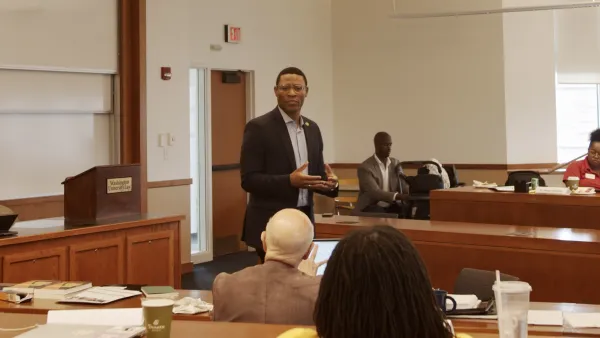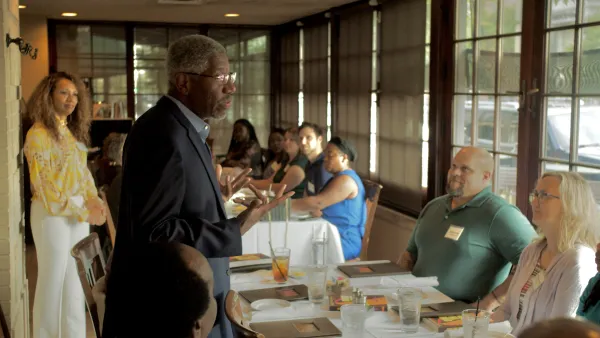
During my years as a PhD student in Black studies, I regularly overheard the allegation that undergraduate students took our classes because they wanted an “easy A.” Worse was learning that students’ advisers across campus had, at times, persuaded them onto our rosters to somehow offset a poor performance in “rigorous” courses such as Organic Chemistry or Calculus II. With the expectation of ease, some students expressed frustration with the reading load. Others embraced the challenge, finding inspiration and empowerment in the skills they gleaned and could apply to other areas of their studies and their life. I call this practice “academic anti-blackness,” that is, the systemic inferiorization of Black studies as a serious field by individuals and institutions that leads to the precarity and second-class status of our faculty, students and the surrounding communities, the vast majority of whom are Black.
The disparagement of Black studies is nothing new. The book bans and defanging of AP African American Studies curriculum in America’s K–12 schools are neither historically ungrounded nor disconnected from the seemingly innocent “what-are-you-gonna-do-with-that?” interrogations from parents, the underfunding of historically Black colleges and universities, tenure denials of Black faculty and the exhausting pressures that many of my Black colleagues experience as they serve as a diverse face for their institutions in administrative leadership roles and on campuswide committees. The unacknowledged burden of Black studies departments across U.S. colleges and universities has been to make other people and these institutions feel secure, charitable and content with themselves, as if they have done enough to support a multicultural society. But having a Black studies program and a racially diverse faculty, staff and student body is not the final step. It is the first. Black studies and what it represents on U.S. college campuses and academia writ large is an imperative toward our future as a veritable democracy, willed by struggles forged in our past.

Black studies as a field exists because Black students broke the rules. At the height of civil rights, Black Power and African decolonization during the late 1960s and early ’70s, they protested university administrations, occupied buildings, held walkouts and teach-ins and were arrested as they demanded the establishment of Black studies across U.S. higher education, including at WashU. In the ’80s, Black students renewed these demands. They constructed encampments to push universities and the U.S. government to boycott, divest and place sanctions on the apartheid regime in South Africa. In the ’90s, Black students in California went on strike in solidarity with Latinx, Native and Asian American classmates in the appeal for ethnic studies programs and funding. These actions spurred a national movement to hire more faculty of color that has solidified these fields as we know them today.
Now, Black studies departments and programs dot all 50 states. Our BAs, MAs and PhDs contribute prolifically to every sector of U.S. society, from healthcare, technology and the arts, to law, education and the environment. Among the ranks of Black studies alumni from WashU are several in community activism and services, like Brittany Packnett Cunningham (2006), who also led Teach for America in St. Louis and advised President Obama on policing, and Flint Fowler, PhD (1980), who served as president of the Boys & Girls Clubs of Greater St. Louis for 28 years. In the realm of politics, Tyrin Truong (2021) is the current and youngest ever mayor of the town of Bogalusa, Louisiana, and Raumesh Akbari (2006) is a Democratic senator and the minority leader in the Tennessee legislature. In healthcare, Heather Skanes, MD (2010), is an obstetrician and gynecologist who established Oasis Women’s Health, a birthing center in Birmingham, Alabama, geared toward Black maternal health. And through the power of the written word, Perry Stein (2011) is a decorated journalist writing on the U.S. Justice Department for The Washington Post, while Taylor Bailey (2019) is a literary scholar, storyteller and public historian at the University of Wisconsin-Madison. Our society is stronger because scores of Black students and allies made a collective demand that predominantly white institutions make room for other ideas and approaches to race. As stakeholders in the community of Black studies, our students keep us grounded to what matters: to build a more equitable world that does not fear the truth but accepts it as a challenge. In doing so, each subsequent generation of students in Black studies joins our chorus to hold our universities accountable to the values of a multicultural, democratic society.

And yet, here I stand, the elephant in the room: a gay white man in Black studies writing this. During my undergraduate studies, I, too, received snarky comments from white peers that I only minored in the field to pad my GPA. But Black studies challenged me to think about race critically through a global lens. Over the past 18 years, with a BA, MA and PhD in Black studies, the field has offered me an intellectual home and community. Now, as a scholar of blackness in Latin America and the Caribbean and a translator, I often compare my early experiences as a student of Black studies to that of learning another language. A Black studies grammar has different modes, syntax and inflections than what I had ever been exposed to in high school and, frankly, in other disciplines. I had to stop and listen, absorbing all the information possible before I felt prepared to speak. After years of reflection, I discovered that Black studies afforded me the vocabulary to talk about my own identity and whiteness as a sociocultural and political structure — and, contrary to conservative punditry, without guilt or shame. The rigorous interdisciplinary study of blackness and an accountability to local and global Black communities, as the pillars of Black studies scholarship, have given me a sense of place in knowing exactly who I am and how I walk in this world.
Black studies afforded me the vocabulary to talk about my own identity and whiteness as a sociocultural and political structure — and, contrary to conservative punditry, without guilt or shame. The rigorous interdisciplinary study of blackness and an accountability to local and global Black communities, as the pillars of Black studies scholarship, have given me a sense of place in knowing exactly who I am and how I walk in this world.
As we will hear in Khalil Gibran Muhammad’s lecture on October 24, the undue burden placed on Black studies may lie at the heart of its mission. Our cutting-edge exploration of global blackness, grounded in multiple lines of inquiry and coupled with our unwavering commitment to students and the uplift of Black communities, positions us at the forefront of academic institutions. We are uniquely qualified to propose solutions that work to dismantle the structural racism underpinning U.S. higher education and society. The interdisciplinary skills we cultivate, along with our core values of empathy and community, empower students to embark on journeys of self-discovery, shaping them into informed global citizens. While Black studies is no easy A, the rewards of its pursuit of knowledge and social transformation are immeasurable.


